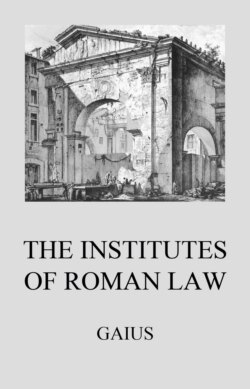Читать книгу Institutes of Roman Law - Gaius - Страница 10
На сайте Литреса книга снята с продажи.
ОглавлениеIII. ON DIVERSITIES OF CONDITION.
§ 9. The first division of men by the law of persons is into freemen and slaves.
§ 10. Freemen are divided into freeborn and freedmen.
§ 11. The freeborn are free by birth; freedmen by manumission from legal slavery.
§ 12. Freedmen, again, are divided into three classes, citizens of Rome, Latins, and persons on the footing of enemies surrendered at discretion. Let us examine each class in order, and commence with freedmen assimilated to enemies surrendered at discretion.
§ 12. As Gaius has not marked very strongly the divisions of the present book, it may be worth while to consider what are the leading branches of the doctrine of Status. Status falls under three heads—liberty (libertas), citizenship (civitas), and domestic position (familia).
Under the first head, men are divided into free (liberi) and slaves (servi): the free, again, are either free by birth (ingenui) or by manumission (libertini). We have here, then, three classes to consider: ingenui, libertini, servi.
Under the second head men were originally divided into citizens (cives) and aliens (peregrini). The rights of citizens fall into two branches, political and civil, the former being electoral and legislative power (jus suffragii) and capacity for office (jus honorum); the latter relating to property (commercium) or to marriage (connubium). Aliens were of course devoid of the political portion of these rights (suffragium and honores); they were also devoid of proprietary and family rights as limited and protected by the jus civile (commercium and connubium), though they enjoyed corresponding rights under the jus gentium. At a subsequent period a third class were intercalated between cives and peregrini, namely, Latini, devoid of the political portion of the rights of citizenship, and enjoying only a portion of the private rights of citizenship, commercium without connubium. Here also, then, we have three classes, cives, Latini, peregrini.
The powers of the head of a family came to be distinguished by the terms potestas, manus, mancipium: potestas, however, was either potestas dominica, power over his slaves, or potestas patria, power over his children, which, at the period when Roman law is known to us, were different in kind; so that the rights of paterfamilias were really fourfold. Manus or marital power placed the wife on the footing of filiafamilias, which was the same as that of filiusfamilias. Paterfamilias had a legal power of selling (mancipare) his children into bondage; and mancipium, which is also a word used to denote a slave, designated the status of a filiusfamilias who had been sold by his parent as a bondsman to another paterfamilias. In respect of his purchaser, such a bondsman was assimilated to a slave: in respect of the rest of the world, he was free and a citizen, though probably his political capacities were suspended as long as his bondage (mancipii causa) lasted, § 116*. As slaves are treated of under the head of libertas, and the status of the wife (manus) was not legally distinguishable from that of the son, we may say, that in respect of domestic dependence or independence (familia), as well as in respect of libertas and civitas, men are divided into three classes,—paterfamilias, filiusfamilias, and Qui in mancipio est; paterfamilias alone being independent (sui juris), the other two being dependent (alieni juris) in unequal degrees.
These different classes are not examined by Gaius with equal minuteness. Under the first head he principally examines the libertini: the classes under the second head, cives, Latini, peregrini, are only noticed indirectly, i. e. so far as they present a type for the classification of libertini; and the bulk of the first book of the Institutions is devoted to domestic relations.
In modern jurisprudence, Status having disappeared, the law of domestic relations—the relation of husband to wife, parent to child, guardian to ward—constitutes the whole of that of which formerly it was only a part, the law of Persons. It differs from the rest of the civil code in that, while the relations of Property and Obligation are artificial and accidental, the relations governed by the code of the Family are natural, and essential to the existence of the human race: so much so that the principal relations of the family extend to the rest of the animal world, and the portion of the code relating to them is called by Ulpian pre-eminently jus Naturale, Dig. 1, 1, 3, Inst. 1, 2 pr. Secondly, whereas every feature of Property and Obligation is the creation of political law, Domestic life is only partially governed by political law, which leaves the greater portion of its rights and duties to be ruled by the less tangible dictates of the moral law.
The pure law of the Family, that is, when we exclude all consideration of Property and Obligation relating to property, is of very moderate compass: but with the pure code of the family it is convenient to aggregate what we may call with Savigny, Syst. § 57, the applied code of the Family, i.e. such of the laws of Property and Obligation as concern members of the family group—husband and wife, parent and child, guardian and ward. The main divisions then of the substantive code are Family law Pure and Applied; the law of Ownership; and the law of Obligation. If, in view of its importance, we separate from the law of Ownership the law of Rerum Universitates, confining the law of Ownership to the province of Res singulae, we may add to the three we have enumerated a fourth division, the law of Successions per universitatem. Sohm, § 29.
